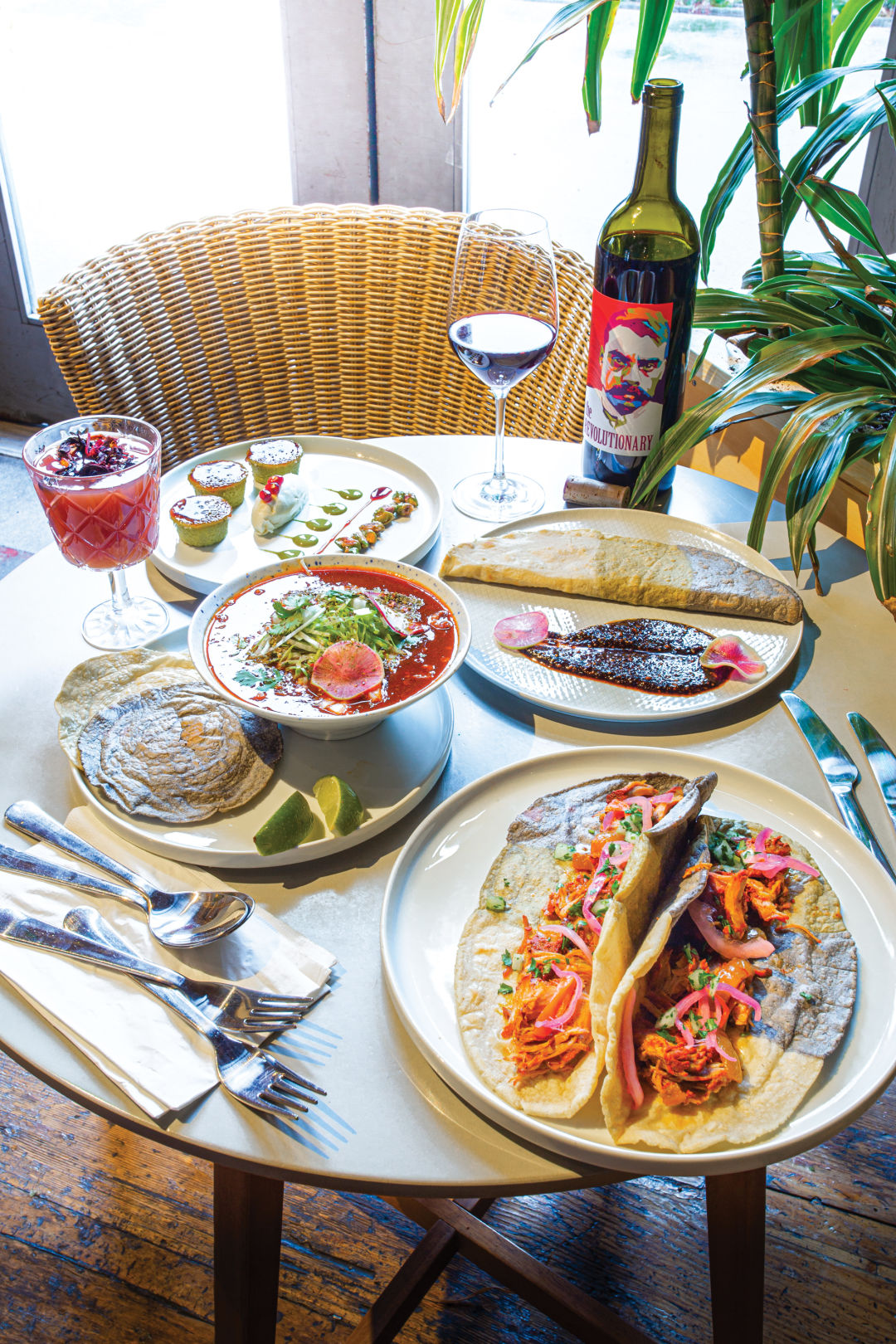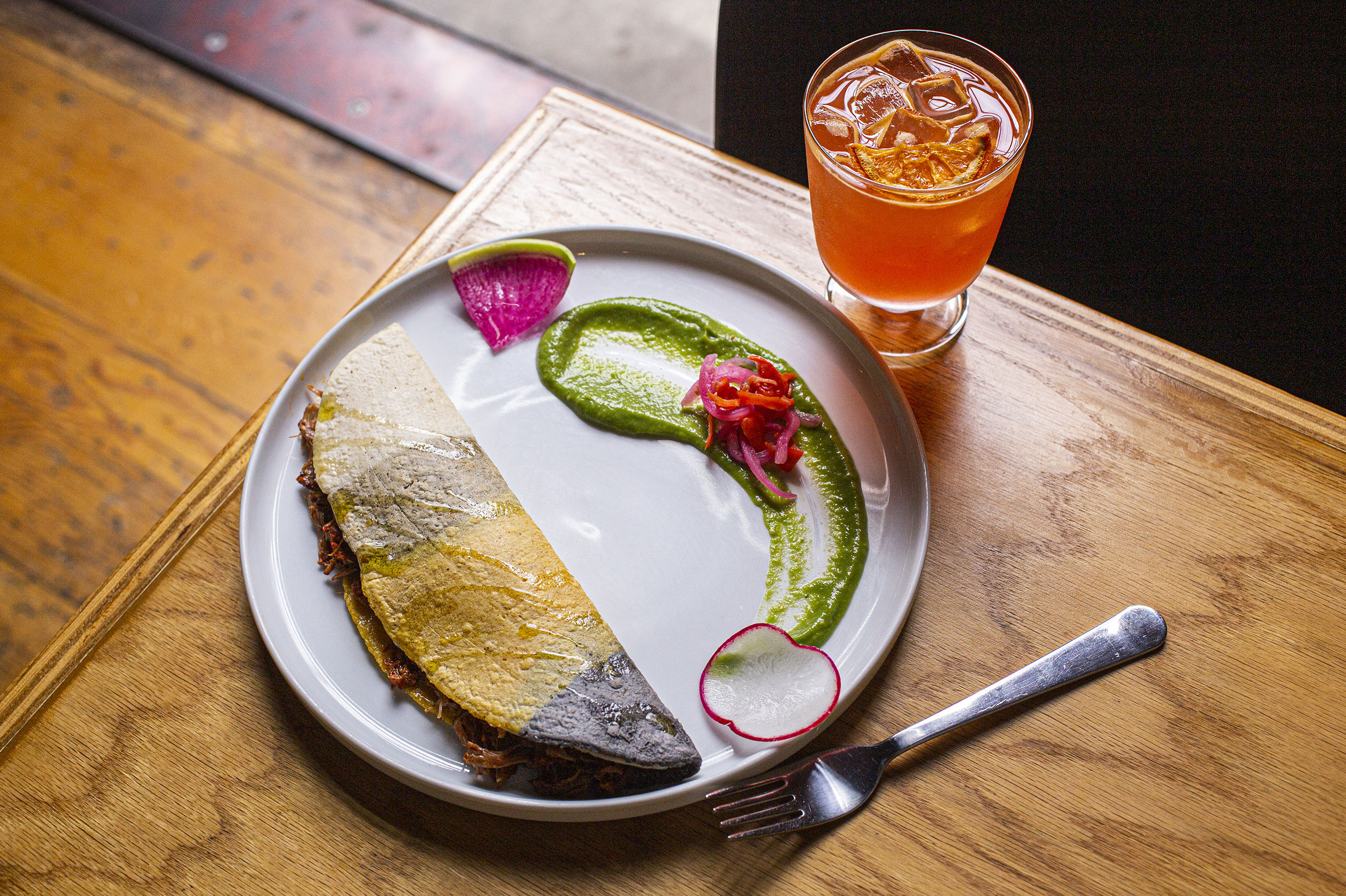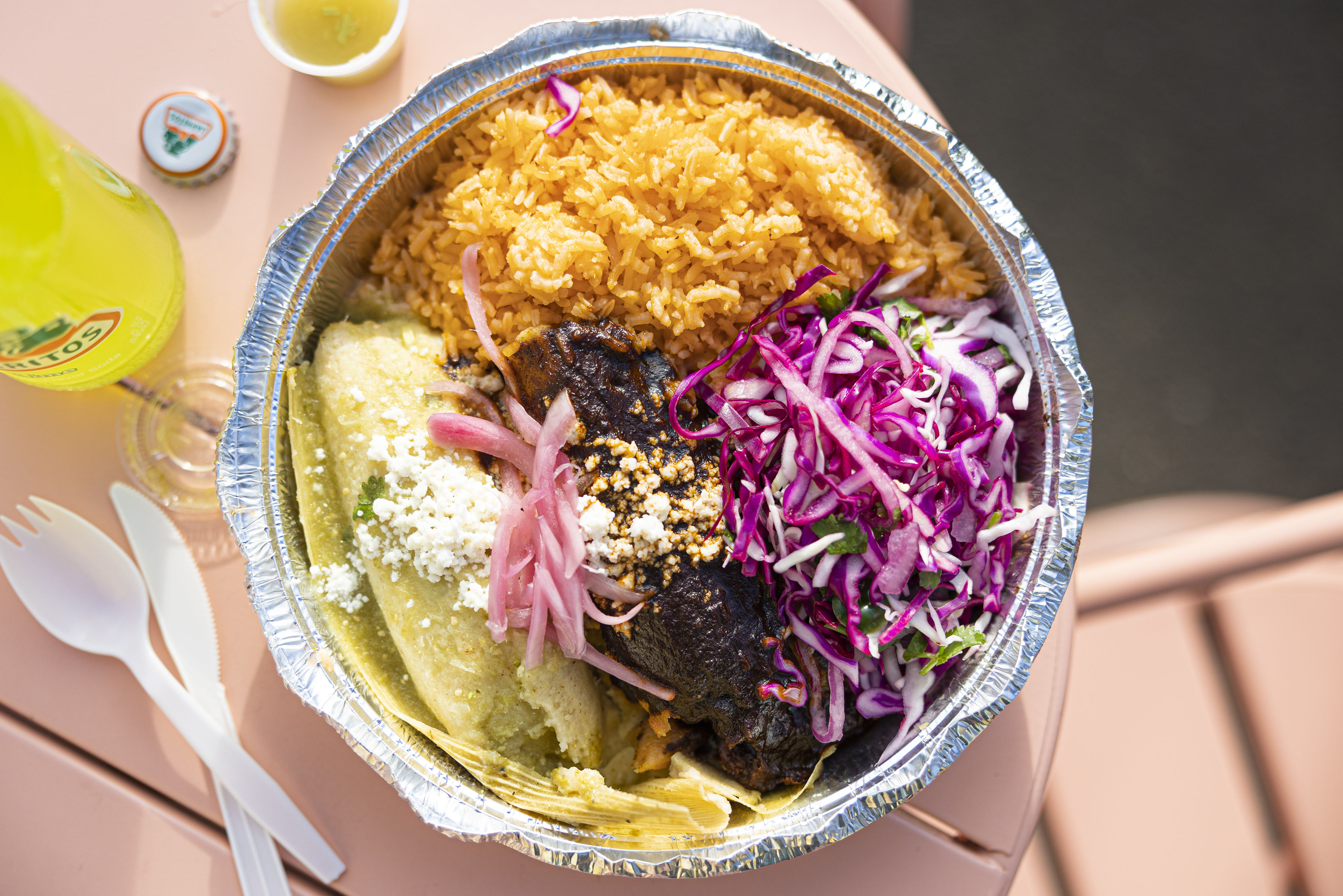Meet the Dream Team at República in Portland's Pearl District

Clockwise from top left: Alvarez’s ponche, Bartruff’s pistachio flan, Cristina Gonzalez’s “The Revolutionary” wine, Doña Chapis’s quesadilla with salsa macha, Doña Chapis’s tacotes with Romero’s guisados, and Torres’s pozole
Image: Michael Novak
No star chef rules the stove at República. Instead, the restaurant, opened last fall, is rooted in collaborative spirit and regional traditions from all over the república of México.
The project started with Angel Medina, the community-building owner of coffee shop La Perlita and champion of Mexican culture who wanted to start a talent incubator. Medina recruited two like-minded co-owners, chef Lauro Romero and pastry chef Olivia Bartruff. Together, they hand-selected some of the best talent in the city. Doña Chapis makes tortillas and handles prep work, Roberto Torres crafts menudo and pozole, and Adriana Alvarez showcases mezcals and tequilas. Even in patio dining and takeout mode, República shape-shifts throughout the day: dishes like cochinita pibil tortas and quesadillas with Oaxacan-style stringy cheese and nutty salsa macha for lunch, cheese plates and wine from Mexican and Mexican-American winemakers in the afternoon, and cocktails and multicourse dinners in the evening.
Say hello to some of the crew.
Doña Chapis: Tortilla Expert
In República’s open-air kitchen, Janet Vargas, a.k.a. Doña Chapis, rhythmically pats blue, white, yellow, and green Three Sisters masa, presses it into tortillas big and small, and flips the rounds on an electric griddle.
Her nickname, Chapis, comes from chaparrita, which means short-statured. At República, her coworkers tacked on Doña to denote respect. She grew up with 14 brothers and sisters in Jalisco, she says via a translator. Her father grew corn and beans; her mother and sisters cooked. When her father returned from the fields, he’d say, “I don’t want any of those paper tortillas from the factory—I want mine handmade.”
Doña Chapis has high standards—and a touch of sass—when it comes to her masa. When she applied to work at República, Medina asked her to make a tortilla using his masa. She glanced at the dry, coarse masa and said, “I can’t make anything with this—maybe [feed it] to the chickens!”
Her favorite part of working at República? Everyone’s having a good time—and you can tell by the food when someone loves working there.
Roberto Torres: The Maestro of Menudo, a.k.a. “DJ Torta”
República’s sous-chef earned the moniker DJ Torta thanks to his skill juggling torta orders during lunch rush. But his specialties are pozole and menudo—recipes he learned in Querétaro with guajillo chiles, cumin, garlic, onion, and a lot of heart.
“To have a good menudo, it has to be made with care and love, exactly how my mom taught me—and as we say a lot at República, ‘con ganas.’ You want to make a good menudo,” Torres says via a translator.
He’s worked in restaurants for 15 years, but República is his first chance to make Mexican food professionally. “I take pride in saying, ‘I took this from Mexico, and I’m taking it to a place that’s serving it now—traditionally.’”
Adriana Alvarez: Cocktail Mover & Shaker
A veteran bartender, Alvarez has made a lot of margaritas. But remembering her 2019 trip to Jalisco, Alvarez is frank: “We weren’t drinking margaritas.” Alvarez was struck by Mexico’s innovative bartenders and wanted to bring that inspiration to Portland. One to-go cocktail creation: the Media Luna, which blends La Luna Cupreata mezcal with Campari, dry vermouth, orange, and pineapple syrup for a mezcal-infused play on a negroni.
Via cocktails and flights, Alvarez plans to showcase mezcal’s wide range of flavors, and the people and process behind it. “Mezcal tells a lot of different stories. It’s not just from Oaxaca; it’s from all over Mexico. Not all mezcals have to be smoky.” Some have notes of stone fruit.
República is a community unlike any other she’s worked in. “We’re now family even though we’ve known each other for a very short time. We want to make sure that everything we’re putting out there is made with love, care—as my dad said, ‘un chingo de amor,’ a shit ton of love—because guests do feel that. They taste that.”
Olivia Bartruff: Creative Baker
Bartruff takes flan in an unexpected direction with pistachio butter and dabs of pomegranate reduction, a brûléed sugar top, mascarpone whipped cream, and crunchy pralined pistachios, plated like abstract art. “I read about [baking] every night before I go to bed—different chemistry things with egg whites, and then I try six different amounts of this and that.”
At República, her world of pastry widens with Mexican ingredients and the ability to bounce ideas around the kitchen. “It’s such a blessing to get to be around Mexican flavors and brilliant Mexican chefs,” she says. And that's how chocolate mousse ends up with a boost of chile negro.
Lauro Romero: Guisado Guide
In the evenings, Romero cooks miso-chile cod as executive chef at King Tide Fish & Shell, infusing hints of his heritage. But when he returns to República during the day, his culture is on full display with guisados, or stews. “It’s a simple food, beautifully done. It’s got a lot of flavor, a lot of depth. There’s history to all this food.”
The pollo enchilado guisado is Romero’s take on barbacoa, a slow-cooked lamb dish from his home state, Hidalgo. An oven subs for the traditional fire pit, and chicken takes the place of lamb. If he can’t get agave leaves, traditionally used to wrap the meat, he recruits banana leaves.
“We’re trying to do something different, unapologetic,” he says. “It’s not about me or Angel or Olivia. It’s also about the people coming in with ideas and dreams and goals, and facilitating a platform for them to grow into—who knows? The future is bright.” 721 NW Ninth Ave, @republicapdx
República’s Salsa Macha
Makes about 2½ cups salsa
- 5 oz (about 1 cup) raw peanuts
- 12 g (about 3–4) whole garlic cloves
- 1 oz (about ¼ cup) sesame seeds, untoasted
- 6 g (about 2–3) dried chile morita
- 4 g (about 8) dried chile de arbol, stems removed
- 16 g (about 1) dried chile ancho
- 20 g (about 2–3) dried chile negro
- 1 tsp dried oregano
- ¾ tbsp kosher salt
- 1 cup peanut oil
- 4 tbsp apple cider vinegar
Preheat oven to 350 degrees. Line a baking tray with foil, place all dried chiles on tray, and toast 3–5 minutes.
In a pan over low medium heat, toast peanuts until golden brown, then set aside. (If you can’t find raw peanuts or sesame seeds, use preroasted ones—just take care not to burn them.) Repeat with garlic cloves and sesame seeds.
In a blender or food processor, combine all chile peppers and blend into a powder. Add peanuts, garlic, oregano, and salt, then blend. Add oil and vinegar, then blend. Taste and adjust salt and vinegar as needed.




